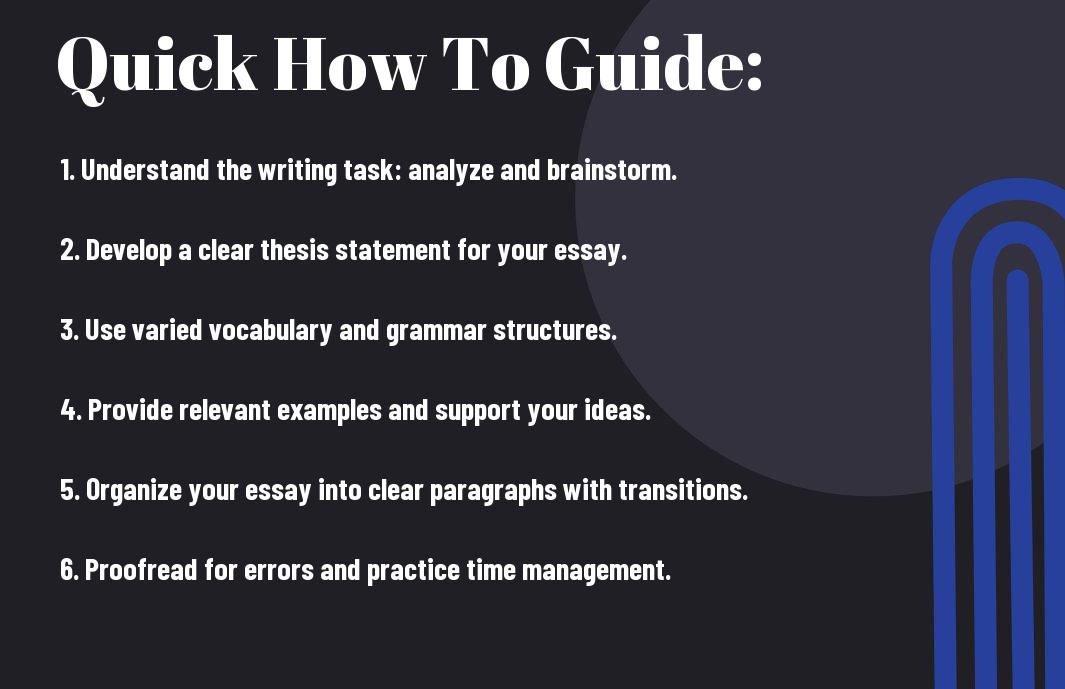Table of Contents
You may also interested:
TL;DR: Essential Tips to Excel in IELTS Writing: Boost Your Skills and Confidence for the Exam
- Understand the Task: Make sure you fully comprehend the task before you start writing to stay on topic and address all requirements.
- Practice Regularly: Consistent practice is key to improving your writing skills and familiarizing yourself with various question types.
- Time Management: Allocate your time wisely during the exam to ensure you have enough time to plan, write, and review your essays.
- Expand Your Vocabulary: Enhancing your vocabulary will allow you to express yourself more clearly and appropriately in your essays.
- Seek Feedback: Get feedback on your writing from teachers, tutors, or online resources to identify areas for improvement and refine your skills.
There’s no denying that the IELTS writing section can be a challenging aspect of the exam for many test-takers. However, with the right strategies and preparation, you can excel in this area. Whether you’re aiming for a high score for academic or immigration purposes, mastering the IELTS writing section is crucial. In this blog post, we’ll provide you with top 10 effective tips to help you hone your writing skills and boost your confidence for the IELTS exam. For more detailed insights and strategies, you can also refer to our article on Mastering IELTS Preparation: Top 10 Tips for Teachers. Let’s dive in and enhance your IELTS writing performance!


Getting Started with IELTS Writing
Familiarizing Yourself with the Test Format
For a strong start in your IELTS writing journey, familiarize yourself with the test format. Understand the different task types – such as essay writing, letter writing, or report writing – and the expectations for each.
Identifying Common Topics and Question Types
Little can compare to the advantage of identifying common topics and question types in IELTS writing. By recognizing recurring themes like education, technology, environment, or health, you can prepare effectively and boost your confidence. Assume that you may encounter topics related to these themes in your test. Importantly, categorize question types like opinion essays, advantages and disadvantages, problem-solving, or double questions.
Types of Question Formats
| Question Type | Description |
| Opinion Essays | Express your opinion on a given topic |
| Advantages and Disadvantages | Weigh the pros and cons of an issue |
| Problem-Solving | Propose solutions to a given problem |
| Double Questions | Answer two related questions in one response |

Essential Writing Techniques
Planning Your Essay: Outline and Structure
Once again, before stepping into writing your essay, it is crucial to spend some time planning and structuring your thoughts. Some key steps to take include creating an outline that outlines the main points you want to cover and the order in which you will address them. This will help you stay focused and ensure that your essay flows logically from start to finish.
Ensuring Clarity: Vocabulary and Grammar Tips
Pertaining to IELTS writing, using clear and precise language is vital for conveying your ideas effectively. Some vocabulary and grammar tips to consider include avoiding overly complex sentences, using a variety of sentence structures, and paying attention to word choice. If you are unsure about the meaning of a word, it is best to look it up in a dictionary to ensure you are using it correctly.
- Using transitional words and phrases can help improve the flow of your writing and make your ideas easier to follow.
- Avoid using slang or informal language in your essay, as this can detract from the overall professionalism of your writing.
Plus
Additionally, paying attention to grammar rules such as subject-verb agreement, verb tense consistency, and punctuation can significantly improve the clarity of your writing. The more polished and error-free your essay is, the easier it will be for the examiner to understand your ideas and award you a higher score.
Advanced Strategies for High Scores
Many IELTS test-takers strive to achieve high scores in the writing section. To excel in this part of the exam, it is crucial to master advanced strategies that can help elevate your writing to the next level. For a comprehensive guide on writing tips, you can refer to 10 tips for IELTS General Training Writing. Below, we break down some key strategies into actionable steps to help you succeed in the IELTS writing test.
Mastering the Art of Argumentation
Even if you possess strong English language skills, mastering the art of argumentation is crucial for achieving a high score in the IELTS writing section. To effectively argue your point, make sure to present a clear thesis statement supported by relevant examples and evidence. Your arguments should be logical, coherent, and persuasive, showcasing a deep understanding of the topic at hand.
Time Management: Maximizing Your Writing Time
One of the most critical aspects of excelling in the IELTS writing section is efficient time management. To maximize your writing time, it is crucial to plan your essay structure before you begin writing. Allocate specific time for brainstorming, outlining, writing, and revising. By managing your time effectively, you can ensure that you address all parts of the writing task and produce a well-structured and coherent essay within the allocated time frame.
Practice Makes Perfect
Effective Practice Activities for Each Task Type
Even the most talented writers need practice to excel in IELTS Writing. To enhance your skills, allocate specific time daily to complete practice tasks for each writing type (Task 1 or Task 2). For Task 1, practice describing visual information effectively within the time limit. For Task 2, focus on developing clear arguments supported by relevant examples. Utilize online resources or IELTS preparation books for a variety of sample tasks to work on consistently.
Using Feedback to Improve Your Writing
On your journey to mastering IELTS Writing, feedback is your best friend. After completing practice tasks, seek feedback from a qualified IELTS tutor, language teacher, or even study partners. Analyze the feedback provided on your structure, coherence, vocabulary, and grammar. Use this input to identify areas for improvement and tailor your subsequent practice sessions to address these weaknesses effectively. Note, constructive criticism is crucial for progress.
It is necessary to dedicate ample time to practice and utilize feedback effectively to enhance your IELTS Writing skills. By incorporating these strategies into your study routine consistently, you will be better equipped to tackle the writing tasks with confidence and achieve your desired band score.
Conclusion
On the whole, mastering IELTS Writing requires practice, preparation, and following important tips. By familiarizing yourself with the test format, improving your grammar and vocabulary, understanding the different task types, and practicing with time constraints, you can increase your chances of success. Remember to plan your essay structure, provide sufficient support for your arguments, and proofread your writing for errors. Additionally, staying updated on current events and using diverse sentence structures can help elevate the quality of your responses. With dedication and perseverance, you can improve your writing skills and achieve your desired band score in the IELTS exam.
FAQ
Q: What is the key to mastering IELTS Writing?
A: The key to mastering IELTS Writing is practice and familiarizing yourself with the test format and requirements.
Q: How can I improve my writing skills for the IELTS exam?
A: To improve your writing skills for the IELTS exam, read various types of academic texts, practice writing essays regularly, and seek feedback from a teacher or tutor.
Q: What are the common mistakes to avoid in IELTS Writing?
A: Common mistakes to avoid in IELTS Writing include poor organization, grammar and vocabulary errors, not addressing the task requirements, and failing to proofread your work.
Q: How can I manage my time effectively during the IELTS Writing exam?
A: To manage your time effectively during the IELTS Writing exam, allocate specific time for planning, writing, and reviewing your essays. Practice timed writing sessions to improve your speed.
Q: Is it important to understand the assessment criteria for IELTS Writing?
A: Yes, it is crucial to understand the assessment criteria for IELTS Writing, which include task response, coherence and cohesion, lexical resource, and grammatical range and accuracy. Familiarize yourself with these criteria to score well on the exam.





